The Works of John Owen (17 vols.)
Digital Logos Edition
Overview
John Owen counts as one of the most influential and inspiring theologians of the seventeenth century. His works capture the essence of theological inquiry in Puritan England, and have shaped and influenced theological reflection ever since. Owen was a proficient writer, composing numerous theological treatises, meditations, discourses, and sermons. His reflections are made more compelling by the context of political turmoil and religious persecution in which he wrote. God still speaks, says Owen, when the world is in flux and the church finds itself in seeming peril—words as important to his original audience as they are to contemporary readers. His writings and teachings spoke to the struggles in his time, and have continued to inspire the generations that have followed.
Logos is pleased to offer the Gold edition of John Owen’s works in English with the original Latin treatises completely retained in portions of volume sixteen and the entirety of volume seventeen. Unlike modern reprints of Owen's work, which leave out the Latin, this edition offers Owen's original English and Latin works. That makes the Logos edition of The Works of John Owen a vital tool for research on Owen’s original writings and the preeminent academic standard for Owen scholarship.
Get a better deal when you get these volumes as part of the complete 24-volume Works of John Owen!

- Seventeen titles from one of the most influential theologians of the 17th century
- Original Latin treatises in two volumes
For solidity, profundity, massiveness and majesty in exhibiting from Scripture God’s ways with sinful mankind there is no one to touch him.
—J. I. Packer
. . . the greatest theologian who has ever written in the English language.
To have known the pastoral ministry of John Owen . . . (albeit in written form) has been a rich privilege; to have known Owen’s God an even greater one.
—Sinclair Ferguson
In all our life and ministry, as we care for people and contend for the faith, we can learn much from Owen’s pursuit of holiness in private and public. . . . I thank God for John Owen’s unwavering passion for communion with God. We are debtors to his mighty pen and to the passion for God’s glory . . . that drove it.
John [Owen], English theologian, was without doubt not only the greatest theologian of the English Puritan movement but also one of the greatest European Reformed theologians of his day, and quite possibly possessed the finest theological mind that England ever produced.
—C. R. Trueman
- Title: The Works of John Owen
- Publisher: Logos Research Systems, Inc.
- Volumes: 17
- Pages: 9,800
This title is included in the following collections
You can save when you purchase this product as part of a collection.
Logos 8 Reformed Bronze Legacy...
$89.99$89.99The Works of John Owen (24 vol...
$149.99$149.99Logos 8 Reformed Silver Legacy...
$349.99$349.99Logos 9 Reformed Silver Legacy...
$349.99$349.99
- $849.99
- $849.99
- $849.99
- $849.99
- $849.99
- $1,099.99
- $1,499.99
- $1,499.99
- $1,499.99
- $1,499.99
- $1,499.99
- $2,999.99$2,249.99
- $2,999.99
- $2,999.99
- $2,999.99
- $2,999.99
- $2,999.99
- $2,999.99
- $4,749.99$3,562.49
- $4,749.99
- $4,749.99
- $4,749.99
- $4,749.99
- $4,749.99
- $4,749.99
- $12,102.39$7,299.99
- $11,399.99
- $11,399.99
- $23,999.99$17,999.99
- $21,749.99
- $24,999.99
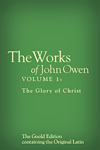
Andrew Thomson’s biography traces Owen’s life from his birth at Stadhampton, through his pastoral ministries in Fordham and Coggeshall, his years of public service as chaplain under Cromwell and as Vice-Chancellor at Oxford University, and his last days as a preacher and pastor in London.
- Life of Owen, by Andrew Thomson
- On the Person of Christ
- Meditations and Discourses on the Glory of Christ
- Meditations and Discourses on the Glory of Christ applied to Sinners and Saints
- Two Short Catechisms
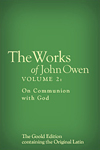
One of his greatest works, John Owen draws from clear, Biblical exposition to outline the place of the Trinity in Christian doctrine and practice. Owen examines the doctrine of the Trinity and its centrality in Christian orthodoxy, and he counters rationalist skeptics and mystic opponents.
- Vindication of the Preceding Discourse
- Vindication of the Doctrine of the Trinity
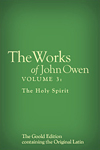
Owen begins his examination of the doctrine of the Holy Spirit in this volume, which he completes in volume four. In particular, Owen explores the identity and mission of the Holy Spirit; the role of the Holy Spirit in the Old and New Testament, and the work of the Holy Spirit in sanctification, obedience, and holiness.
- Discourse on the Holy Spirit
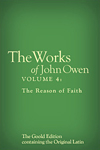
Volume Four contains the second part of Owen’s work on the Holy Spirit. Here Owen connects the Holy Spirit to illumination, supplication, and consolation. He also examines the Holy Spirit's role as the author of spiritual gifts.
- Causes, Ways, and Means of Understanding the Mind of God
- On the Work of the Holy Spirit in Prayer
- Of the Holy Spirit and His Work, as a Comforter and as the Author of Spiritual Gifts
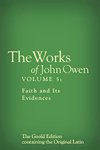
In volume five, Owen offers a non-speculative and non-scholastic account of justification by faith, addressing both theological and pastoral concerns. Challenges from the Roman Catholic Church and confusion in Protestant circles compelled him to write this straightforward biblical exposition.
- The Doctrine of Justification by Faith
- Evidences of the Faith of God’s Elect
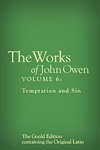
Temptation and Sin
- Author: John Owen
- Publisher: Logos Research Systems, Inc.
- Publication Date: 2008
- 648 pages
John Owen's works on temptation and sin stem from his pastoral concern for the church in England.
- On the Mortification of Sin
- On Temptation
- On Indwelling Sin in Believers
- Exposition of Psalm 130
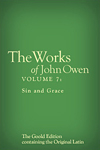
Sin and Grace
- Author: John Owen
- Publisher: Logos Research Systems, Inc.
- Publication Date: 2008
- 560 pages
In this volume, Owen concludes his account of justification begun in volume five.
- The Nature and Causes of Apostasy
- On Spiritual-Mindedness
- On the Dominion of Sin and Grace
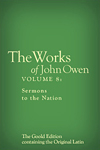
Sermons to the Nation
- Author: John Owen
- Publisher: Logos Research Systems, Inc.
- Publication Date: 2008
- 658 pages
Volume eight is comprised of sixteen sermons published during Owen's lifetime.
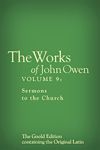
Sermons to the Church
- Author: John Owen
- Publisher: Logos Research Systems, Inc.
- Publication Date: 2008
- 622 pages
Volume nine contains eighty three sermons, including fourteen on "Practical Cases of Conscience" and twenty five on preparation for Communion. Other subjects covered include charity, Christ's pastoral care, pastoral duty, and the excellency of Christ.
- Posthumous Sermons
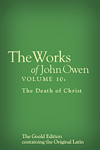
The Death of Christ
- Author: John Owen
- Publisher: Logos Research Systems, Inc.
- Publication Date: 2008
- 624 pages
In this polemical work, Owen refutes the Arminian doctrine of universal redemption as unscriptural and destructive of the gospel. Owen insists on Christ’s death as the means for procuring salvation for those sinners chosen by God, and connects this doctrine of salvation with the doctrine of the Trinity. The Father authors salvation and sends the Son; the Son dies; the Holy Spirit compels those chosen by God to accept salvation.
- A Display of Arminianism
- The Death of Death in the Death of Christ
- Of the Death of Christ
- A Dissertation on Divine Justice
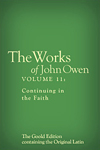
Continuing in the Faith
- Author: John Owen
- Publisher: Logos Research Systems, Inc.
- Publication Date: 2008
- 666 pages
Owen continues his refutation of Arminian doctrine begun in volume ten by arguing against John Goodwin’s work and vindicating the concept of the perseverance of the saints.
- The Doctrine of the Saints’ Perseverance Explained and Confirmed
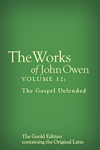
The Gospel Defended
- Author: John Owen
- Publisher: Logos Research Systems, Inc.
- Publication Date: 2008
- 639 pages
Owen traces the history of Socinianism and examines the Socinian views of Scripture, the divine nature and character of God, the person and the work of Christ, the Holy Spirit, the past and present condition of man, election and justification.
- Vindiciae Evangelicae: or, the Mystery of the Gospel Vindicated
- Of the Death of Christ, and of Justification
- A Review of the Annotations of Grotius
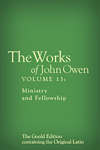
Ministry and Fellowship
- Author: John Owen
- Publisher: Logos Research Systems, Inc.
- Publication Date: 2008
- 592 pages
Owen mediates the charge of schism brought against those who sought to reform the Church according to Scripture.
- The Duty of Pastors and People Distinguished
- Eshcol: a Cluster of the Fruit of Canaan
- Of Schism, in Three Books
- Nonconformity Vindicated
- Tracts on the Power of the Magistrate, Indulgence, Toleration, etc.
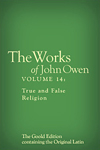
True and False Religion
- Author: John Owen
- Publisher: Logos Research Systems, Inc.
- Publication Date: 2008
- 555 pages
This volume contains Owen’s exhaustive response to an attempt by Franciscan Friar John Vincent Cane to recommend Roman Catholicism as the remedy for religious and civil discord in Britain. The volume also includes a lengthy excursus on the state of seventeenth century Protestantism.
- Animadversions of ‘Fiat Lux’
- Vindication of Animadversions
- The Church of Rome No Safe Guide
- Some Consideration of Union among Protestants
- The State and Fate of Protestantism
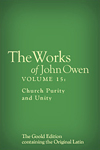
Church Purity and Unity
- Author: John Owen
- Publisher: Logos Research Systems, Inc.
- Publication Date: 2008
- 530 pages
Owen explores ecclesiological matters, with treatises on liturgy and worship, and the importance of love, peace, and unity.
- Discourse Concerning Liturgies
- Discourse Concerning Evangelical Love, Church Peace, and Unity
- Inquiry Concerning Evangelical Churches
- Answer to Dr. Stillingfleet on the Unreasonableness of Separation
- Instruction in the Worship of God
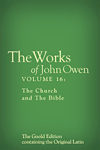
The Church and The Bible
- Author: John Owen
- Publisher: Logos Research Systems, Inc.
- Publication Date: 2008
- 597 pages
In this volume, Owen concludes his treatises on ecclesiology by examining the sacraments and the role of the Gospel in the church. He also emphasizes the need for church discipline and doctrinal correctness. Portions of volume sixteen retain Owen's original, untranslated Latin works.
- The Nature of a Gospel Church
- Tracts on Excommunication, Church Censures, Baptism, etc.
- Divine Original, Authority, Self-evidencing Light, and Power of the Scriptures
- Posthumous Sermons
- Latin Works
- Indices
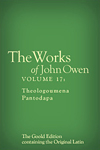
This volume contains Owen's treatise on the origin, history and progress of theology from the Fall to the present. The last chapter describes Owen's method of theological study and prospects for the future of theology. The entirety of volume seventeen retains Owen's original, untranslated Latin works.
- Natural Theology
- Theology of Adam
- Theology of Noah
- Theology of Abraham
- Theology of Moses
- Evangelical Theology

John Owen was born at Stadhampton, Oxfordshire in 1616. He entered Queen's College, Oxford, at the age of twelve and completed his M.A. in classics and theology in 1635 at the age of nineteen. He was ordained shortly thereafter and left the university to be a chaplain to the family of a noble lord. His first parish, in 1637, was at Fordham in Essex, to which he went while England was involved in civil war. It was here that he became convinced that the Congregational way was the scriptural form of church government. In the 1640s he became chaplain to Oliver Cromwell, the new "Protector of England," and traveled with him on his expeditions to Ireland and Scotland. Between 1651 and 1660, he played a prominent part in the religious, political, and academic life of the nation. In 1651 he was appointed dean of Christ Church and in 1652 made Vice-Chancellor of Oxford—positions which allowed him to train ministers for the Cromwellian state church. He lost his position in 1660, however, when the restoration of the monarchy began after the death of Cromwell in 1658. Owen moved to London and led the Puritans through the bitter years of religious and political persecution—experiences which shaped his theological inquiry, pastoral reflection, and preaching. He also declined invitations to the ministry in Boston in 1663, and declined an offer to become president of Harvard in 1670. He died in August, 1683.
Reviews
7 ratings

Bradley Christian
9/7/2019
I purchased volume 17 to finish out the series of Owen’s works-while I don’t know Latin (the translated works are on the to buy list). On the whole though Owens theology and treaties are the standard of orthodox and valuable to understanding the church, the Holy Spirit, the trinity, suffering, and the mortification of sin! Read these books.
Travis Salsbury
11/12/2017
Allan Story
5/5/2017
Mike
7/19/2014
I participate in a weekly study of Owen as well as many of my own personal studies. These works are my favorite books in all the world besides the scriptures, but the amount of errors I find in the Logos edition are terrible. I can't believe Logos charges what it does for these considering the amount of errors that even a casual reading will find. Still I believe the cost to be well worth it to have these resources in a searchable form and in a form that can be marked up with highlights and notes.Brian Hedges
6/27/2014

JCJN
1/11/2014

Phil Gons
7/14/2013